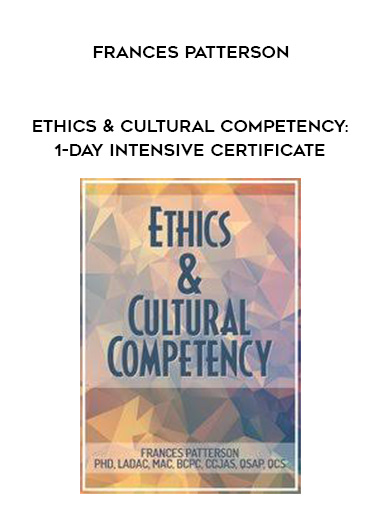ETHICS & CULTURAL COMPETENCY: 1-DAY INTENSIVE CERTIFICATE – FRANCES PATTERSON
Ethics are not always absolute and are often complicated by cultural issues, beliefs, and values. Situations such as whether to accept a gift from a client, encountering a client in a social situation, or living in a small community, as well as more serious issues such as dual relationships, therapeutic touch, and countertransference are influenced by many factors, including culture. When therapists and counselors lack sufficient training, or become complacent or behind on ethics and cultural competency, they may find themselves at risk of losing their professional license, damaging their professional reputation, or encountering legal difficulties due to ethical mistakes or violations.
Learn to address difficult and often complex ethical situations that arise when working with clients. Highlighted issues include clarification of personal values, managing dual relationships, confidentiality and technology, cultural humility, physical touch in therapy, living in smaller communities, and confronting sexual attraction. Dr. Frances Patterson will use didactic, electronic media, and experiential learning techniques, allowing you to explore the dangers of ignoring personal feelings and not addressing issues that arise during sessions with clients. The information you learn will leave you more confident in your ability to manage difficult ethical situations and the cultural issues that often intersect with them.
- Describe the importance of cultural humility in the therapy setting
- Explain boundary crossing vs. boundary violations in session, including cultural implications
- Identify the limitations and risks of using technology to communicate with clients
- Descibe how a clinician should respond when a client gives them gift
- List four subcultures commonly encountered by therapists, and describe how the characteristics of these subcultrues may impact the clinician’s choice of treatment interventions
- Determine how to make sound ethical decisions in session related to dual relationships, transference and countertransference, and touch
- Analyze the controversies surrounding power struggles, gender roles, end of life and religious beliefs, and institutional cultures as they relate to clinical practice
- Identify cultural differences in the concept of self-care as they relate to case conceptualization
GET ETHICS & CULTURAL COMPETENCY: 1-DAY INTENSIVE CERTIFICATE OF AUTHOR FRANCES PATTERSON
THE CULTURE OF THERAPY
- How do I know when and what to report?
- Personal Values
- Personal values and culture
- Cultural humility
- Conflicting client cultural values and perceptions
- Communication differences
COMMUNICATING WITH CLIENTS FROM DIFFERENT GENERATIONS
- Technology and Professionalism
- Texting
- Emailing
- Cell phones in therapy
- Social Networking
BOUNDARIES VS. BOUNDARY VIOLATIONS AND CULTURE
- Rural and small communities and subcultures
- Forensic
- Military
- Faith-based
- Bartering
- Taking sessions outside the sanctioned therapeutic environment
- Encountering clients in social situations
- Gift giving: cultural norms
- Self-disclosure
- Culture of self-help and the recovering counselor
- Role confusion
DUAL RELATIONSHIPS AND CULTURAL CONSIDERATIONS
- Sanctioned therapeutic setting
- In-home
- Homeless clients
- Client perceptions vs. therapist role
TRANSFERENCE AND COUNTERTRANSFERENCE
CULTURAL CONTROVERSIES
- Therapeutic touch
- Power struggles in therapy
- Gender roles and sexuality
- End of life and religious beliefs in therapy
- Managing ethics within institutional cultures
CULTURE DIFFERENCES IN CONCEPT OF SELF-CARE
- Cultural views of self-image







